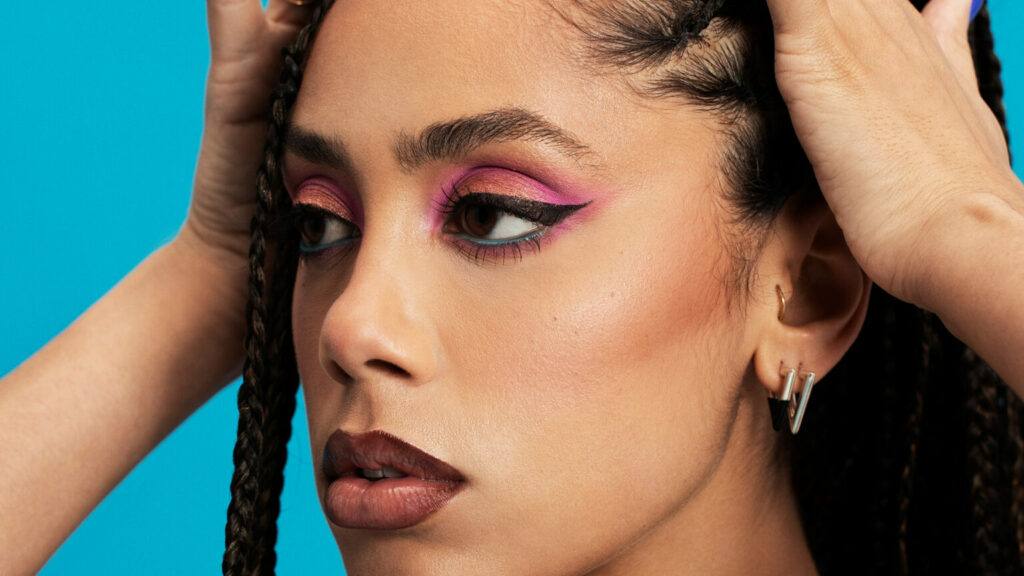Jayda G releases ‘Blue Lights’, inspired by ‘an insane story of my father’s’
"This whole process was really about me learning who my father was as an adult"
By Emma Wilkes

Jayda G has debuted a new single, ‘Blue Lights’ – check it out below.
The track is the latest single to be lifted from her upcoming album ‘Guy’, which is out June 9 via Ninja Tune and tells the story of her father being inadvertently caught up in the Washington Race Riots of 1968 for three days after being locked out of his house.
“Blue Lights” really sets up the sound of the whole album – a very strong electronic sound, while also being more of a dance tune too,” Jayda G told Rolling Stone UK. “It really kind of comes out of the gate at the top of the album, so I just wanted people to hear the complexity and new sound that I was trying to push towards for this new album.”
Elaborating on the story behind the song’s overarching narrative, she said: “The metaphor in the chorus (“3 days of running to you”) is about running towards what you believe in. This is 1968, with the race riots following the death of Martin Luther King. My father was transitioning back from being in the Vietnam War to a very different country than what he left – his ideas were really changing and radicalising a lot. He has this story of how, in the military, you’re allowed to have 1-inch to 1 & 1/4-inch long hair which is really short for white people, but for black people’s hair, this is super long. So my dad would be really pushing those boundaries and rocking a proper afro, and people would get really upset with him but it was him testing those boundaries and pushing towards what he believed in.
“That ties in with the theme of really fighting for what you believe in and also that you have a choice; I keep saying over and over again that you have a choice. Things happen in life that are hard and strange and wonderful and weird, but you always have a choice about how you want to perceive them and how to move forward. My father really did choose a different path from what he was exposed to as a kid and I think that really takes a certain type of person to be able to choose differently from what is around you, especially if you’ve never seen it before.”
Asked how cathartic it was for her to create something so prescient, Jayda G said: “In reality, it was very cathartic and intense, as I gave a lot to the album. It was a real process and I opened up a can of worms if you will, by learning about my father from a different perspective. When we’re kids, we see our parents and think they know everything or they’re superheroes, but then as you get older you find out that they’re just people and we’re all just bumbling through this thing called life. You get to re-do, re-learn and re-evaluate that relationship with your parents and learn how who they are as adults.
She continued: “This whole process was really about me learning who my father was as an adult and how I was able to be really empathetic and put myself in his shoes in terms of his life and what he went through. It gave me an understanding of the type of person he was, and why, and thus where I came from and the values we have as a family, being adventurous, fearless and trying new things even if you’re scared. He was always pushing us to be better people, to be kind, and believing in the best of people – a lot of it is from these stories that my father tells and how he learned from them as he grew older and towards the end of his life.
“This song was definitely timely and it actually kind of made me sad in a way as I was writing it as the Black Lives Matter movement was picking up a lot of steam in 2020 and I realised how things really haven’t changed a lot. It made me think about how cyclical things are, not just in life, not just within family systems (also a big theme within this album), but it’s also cyclical within this society and I think it’s just more of an observation if anything else.
“We still need to fight for our rights and fight for things that we believe in and now, more recently, I think we’re understanding better the systems that are at play here are not just here to serve us as humanity, they’re here to serve one very specific type of person, and that doesn’t involve people who are in poverty or people who are of different backgrounds, colours, ethnicities and cultures. That has to change if we’re going to move forward and I think the younger generation definitely knows this.”
